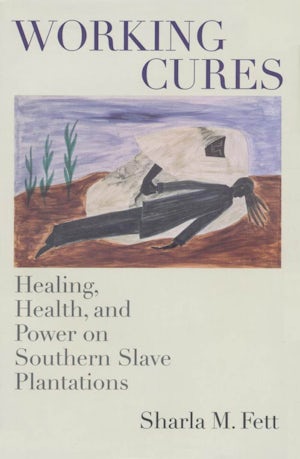Working Cures
Healing, Health, and Power on Southern Slave Plantations
By Sharla M. Fett
304 pp., 6.125 x 9.25, 13 illus., 1 map, notes, bibl., index
-
Paperback ISBN: 978-0-8078-5378-8
Published: May 2002 -
E-book EPUB ISBN: 978-0-8078-9892-5
Published: November 2000 -
E-book PDF ISBN: 979-8-8908-6980-7
Published: November 2000
Gender and American Culture
Buy this Book
- Paperback $42.50
- E-Book $29.99
For Professors:
Free E-Exam Copies
Awards & distinctions
2003 Frank L. and Harriet C. Owsley Award, Southern Historical Association
2003 James A. Rawley Prize, Organization of American Historians
2003 Willie Lee Rose Prize, Southern Association for Women Historians
2003 Julia Cherry Spruill Prize, Southern Association for Women Historians
Fett shows how enslaved men and women drew on African precedents to develop a view of health and healing that was distinctly at odds with slaveholders' property concerns. While white slaveowners narrowly defined slave health in terms of "soundness" for labor, slaves embraced a relational view of health that was intimately tied to religion and community. African American healing practices thus not only restored the body but also provided a formidable weapon against white objectification of black health.
Enslaved women played a particularly important role in plantation health culture: they made medicines, cared for the sick, and served as midwives in both black and white households. Their labor as health workers not only proved essential to plantation production but also gave them a basis of authority within enslaved communities. Not surprisingly, conflicts frequently arose between slave doctoring women and the whites who attempted to supervise their work, as did conflicts related to feigned illness, poisoning threats, and African-based religious practices. By examining the deeply contentious dynamics of plantation healing, Fett sheds new light on the broader power relations of antebellum American slavery.
About the Author
Sharla M. Fett is professor of history at Occidental College.
For more information about Sharla M. Fett, visit
the
Author
Page.
Reviews
"Working Cures reveals how African Americans developed a distinctive health culture that drew on a panoply of therapies, remedies, and botanical knowledge from African, European, and Native American sources. Their philosophies of health and healing, endowed with divine faith, bolstered their abilities to weather and challenge the social order. This is an excellent study sure to invigorate interest in the history of medicine in the antebellum South."—Tera W. Hunter, Carnegie Mellon University To 'Joy My Freedom: Southern Black Women's Lives and Labors after the Civil War—>
"Working Cures digs into an area of slave health untouched by previous historians. By skillful use of key fragments of primary source evidence and contemporary scholarship in fields like cultural and medical anthropology, sociology, and psychology, Fett draws a clearer picture of what health, disease, and doctoring meant to antebellum African Americans. She captures and explains the difference between the ways slaveholders and enslaved African Americans viewed health and healing."—Todd L. Savitt, East Carolina University




